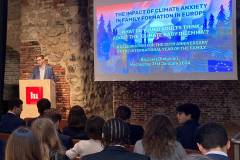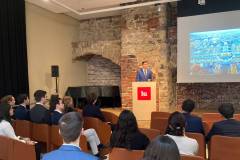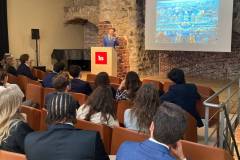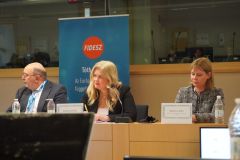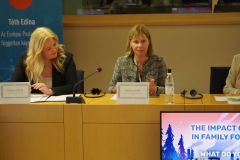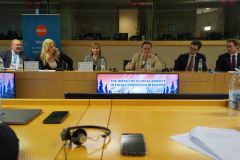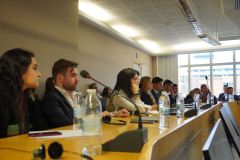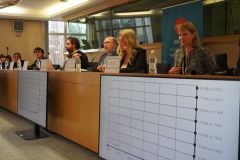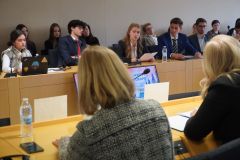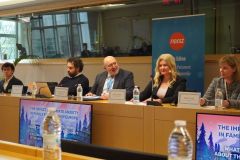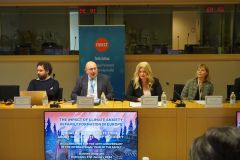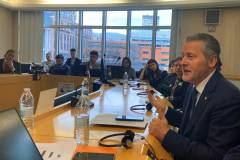

The Impact of Climate Anxiety in Family Formation in Europe
What do young adults think about the ‘Climate Baby Dilemma’?
in Celebration for the 30th Anniversary of the International Year of the Family
Brussels (Belgium)
Wednesday 31st January 2024
If you need to contact the organizers, send an email to network@iffd.org.
“There is an urgent need for further research into the
emotional impact of climate change on children and young people.”
To actively engage with this issue, the International Federation for Family Development (IFFD) is orchestrating a series of events aimed at soliciting the perspectives of youth from around the world. Recognizing that young people are the architects of their own future, these initiatives empower them to learn, deliberate, and make decisions that will shape their destinies. It is our firm belief that by affording the youth a voice in shaping their world, we nurture their passion for effecting positive change from a young age. This, in turn, contributes to the cultivation of future leaders who are committed to making a difference in our global society.
The conclusions and final recommendations of the event will be made public at the 2024 IFFD Briefing during the 62nd Session of the Commission For Social Development at the United Nations Headquarters in New York (5 to 14 February 2024). The Commission will also celebrate the thirtieth anniversary of the International Year of the Family.
DISCUSSION POINTS
1.- Why are young people (18-34) more worried about climate change than adults aged 55 or older?
2.- Why do one-third or more young people think a couple should consider climate change when deciding whether to have children?
3.- How does having a child result in considerable emissions of CO2 per year?
4.- Why have so many joined campaigns pledging to not have kids until the governments take more action to combat climate change?
5.- How does climate change pose a risk to long-lasting mental health problems?
6.- Can it be that young people are not having children for the simple reason of not wanting them?
7.- Are young people too worried about the environment to have children or more worried about the environment after having children?
8.- What are the ethical, environmental, livelihood, and political considerations behind climate change concerns and reproductive decision-making?
9.- Can the need for an economy less hostile to young families be the real reason behind blaming climate anxiety for falling birth rates?
10.- Can children born today and in the future be disproportionately affected by climate change?
11.- Are levels of eco-anxiety growing, particularly among children and young people?
12.- Will climate change affect physical health, mental health, and social relations?
PROGRAM
10.00 -12.30: Liszt Institute
Treurenberg 10, 1000 Bruxelles
Meeting of participants to read their statements
and discuss its contents
10:00: Welcoming Remarks
10:10: Zoltan Arpad Trencsenyi (Hungary)
10:25: Rocío Ramos (Spain)
10:40: Franciszek Wiącek (Poland)
10:55: Ana Paula Perez Hernández (United Kingdom)
11:10: Agathe Vaillant (France)
11:25: Valentina Caro (Spain)
11:40: Maria Waszkiewicz (FAFCE)
11:50: Bence Szabó (MCCU)
Conclusions
14.00 -17.00: European Parliament
Room SPAAK 01C047
Rue Wiertz 60, 1047 Bruxelles

Welcoming Remarks

Edina Tóth
Member of the European Parliament
Committee on the Environment, Public Health and Food Safety
and Subcommittee on Public Health
Opening Remarks

Roberto Ciambetti
President of the Veneto Regional Council
Member of the European Committee of the Regions
Commission for Environment, Climate Change and Energy
and Commission for Natural Resources
Presentation of Youth Statements
and Interactive Discussion
Ana Paula Perez Hernández (United Kingdom)
Rocío Ramos (Spain)
Jaime Sanciñena (Spain)
Agathe Vaillant (France)
Zoltan Arpad Trencsenyi (Hungary)
Questions & Answers
Moderator

Ignacio Socías
Director of International Relations
International Federation for Family Development
Keynote Speech

Emmanuel Pont
Sociologist
Author of ‘Faut-il arrêter de faire
des enfants pour sauver la planète?’
Statements by Members
of the European Parliament
Closing Remarks

Kinga Joó
Member of the European Economic and Social Committee
International Advisor to the President of the
National Association of Large Families of Hungary
President of the Social Responsibility Board at the
National Cooperation Fund of Hungary
CONTEXT
Youth transitions in Europe encompass a multifaceted and intricate landscape, particularly within the context of social and family issues. The challenges faced by new generations vary across the continent, making it a complex endeavor to integrate them seamlessly into society. Crucial aspects such as securing suitable employment, ensuring adequate incomes, and forming families and having children have become akin to navigating an obstacle course in many instances.
One notable demographic trend is the continual increase in the average age of mothers at the birth of their children. This phenomenon has unfolded alongside the initial resurgence of total fertility rates during the first decades of the 21st century, following marked declines in previous years. However, it’s important to note that total fertility rates experienced a significant decline after reaching their peak in 2008. This decline has raised concerns about its implications on demographics, economics, and fiscal matters.
Recent research on OECD countries, employing panel data models and building upon prior studies, has established a link between these fertility fluctuations and shifts in the labor market positions of both men and women. Furthermore, changes in family policies, including parental leave and early childhood education and care, have been identified as contributing factors. This research provides valuable insights into the intricate dynamics that connect family policies, employment, and fertility, shedding light on the factors shaping overall population dynamics.
Debates surrounding the severity of the consequences stemming from these demographic shifts abound. While an aging workforce may pose economic challenges, it can be counterbalanced by a declining young-age dependency ratio and an increased female labor force participation rate.
However, there is another significant dimension that is poised to exert a profound influence in the coming years—the anxiety induced by warnings about climate change and its implications for the future of our planet. A recent extensive study published in The Lancet found that 40% of Generation Z individuals (born between 1990 and 2010) worldwide are hesitant to have children due to concerns about the climate crisis. Similar sentiments have been echoed in surveys of millennials.
As Ilaria Pitti has pointed out within the European context, it is worth keeping in mind that young people’s commitment to the environment is not just a matter of civic and political participation but has also to do with their idea of transitions. Indeed, that commitment entails an idea of the future and thus, also an idea of adulthood. By questioning the current model of growth and its effects on the planet, young people are also questioning the centrality that the economy has in defining who is recognized as an adult and who is not. The standard model of transition to adulthood, by placing work and economic independence as a key step to achieve most of the other markers developed from and sustained the very modern illusion of achieving happiness through a continuous expansion of economy.
The United Nations General Assembly, in Resolution A/RES/77/191 of December 30, 2022, has recognized the impact of climate change trends on families as an important topic for research and awareness-raising activities at national, regional, and international levels. This acknowledgment is part of the preparations for the thirtieth anniversary of the International Year of the Family in 2024, and it will be a central focus of the observance of the International Day of Families on May 15.
Emmanuel Pont, the author of ‘Faut-il arrêter de faire des enfants pour sauver la planète?’ (‘Should We Stop Having Children in Order to Save the Planet?’), argues that attempting to control population growth is both ineffective and unpalatable to many. He contends that enforcing a draconian one-child limit in a country like France would result in only a marginal reduction in emissions, comparable to shutting down all coal-fired power stations. Pont also challenges widely held beliefs regarding the carbon footprint associated with having children.
Furthermore, the question arises: Is climate anxiety justified, or is it indicative of a more general apprehension about the future that seems to characterize young generations?
According to Nick Luxmoore, the core issue with the future is not solely the prospect of climate change, war, unemployment, or other daunting challenges that young people confront. Rather, it is a deeper, existential anxiety that we often underestimate in the young people we care about. We, as older generations, may inadvertently contribute to this issue by envying their youth and their vast potential.
In conclusion, the transitions experienced by young people in Europe are deeply impacted by a myriad of factors encompassing economic, demographic, and environmental considerations. These transitions exhibit intricate and multifaceted dynamics, demanding a comprehensive and nuanced approach. An imperative aspect of this approach is a dedicated focus on the future structure of family policies, which is essential to ensure that families attain the level of well-being required to fulfill their pivotal societal roles.




